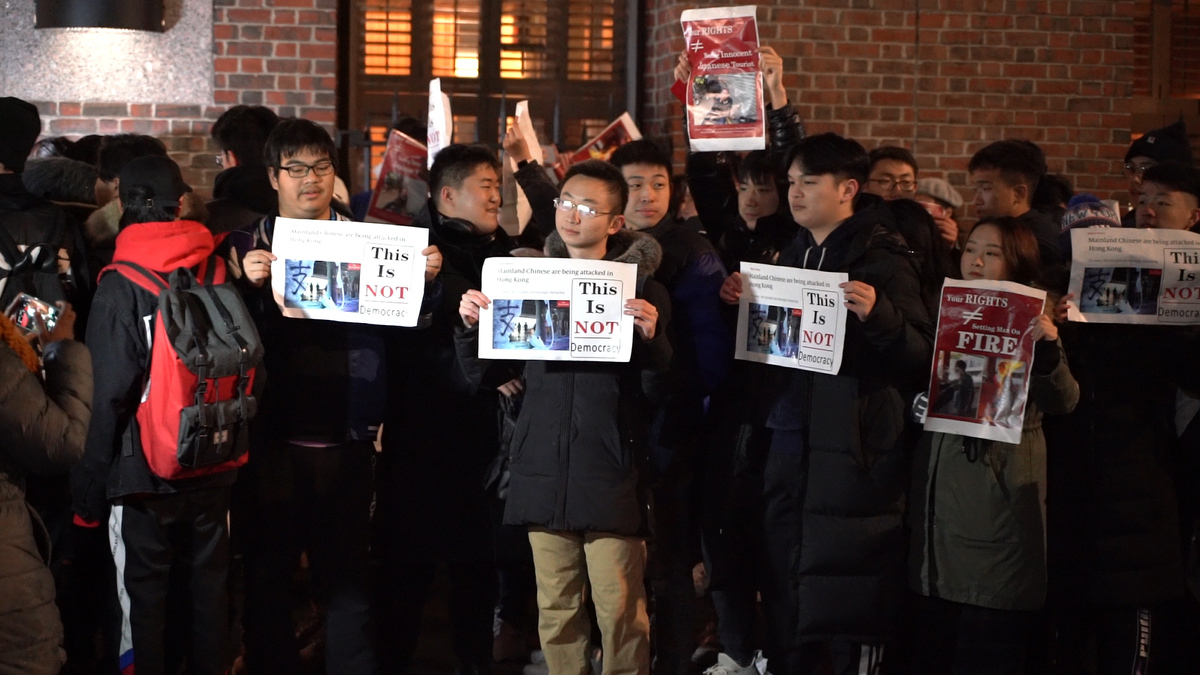Students in NYC protest HK violence
By CHINA DAILY in New York | China Daily Global | Updated: 2019-11-19 23:45

Hundreds of Chinese students protested what they called biased messages about Hong Kong as Nathan Law Kwun-chung, a main figure behind the violence in Hong Kong, attended an event at New York University (NYU) on Monday night.
More than 200 NYU students assembled outside the university's D'Agostino Hall, where Law participated in a university panel titled "Human Rights in Hong Kong".
The students chanted "Peace in Hong Kong" and "No violence" against the riots that have disrupted the city since June.
"We believe that any form of violence, especially those we've seen conducted by Hong Kong protesters, should be condemned," said Mao Bincheng, the organizer of the event and a philosophy student at NYU.
Whatever the protesters are asking for "should not become an excuse for violence", he said. "Those activities are not put under the spotlight by a lot of media, and we see asymmetric information here."
More than 600 students — from China and beyond, along with alumni and local community members signed up for the demonstration that took place in the rain, said Mao, and students planned to take shifts over the evening.
"We are protesting that Nathan Law comes to talk about human rights (and) disregards the acts of violence they've been conducting recently," said Xu Zhikang, an NYU undergraduate student.
"As the panel featured only representatives on one side, I was worried that it would not be able to convey voice from both sides," said Mao. "We don't want it to be a biased panel."
Students held posters with the slogan "This Is Not Democracy", also featuring a news headline from The Economist that said "Mainland Chinese are being attacked in Hong Kong", along with a photo of smashed store windows.
Other posters wrote, "Your rights ≠ stabbing police officer in the neck" and "Your rights ≠ beating innocent Japanese tourist", referring to some recent attacks by rioters in Hong Kong.
Hong Kong reported that a Japanese tourist was injured on Nov 11 by protesters. Japan's foreign minister confirmed that a Japanese man was hurt, and Japan's consulate general in Hong Kong called on Japanese visitors to avoid violent scenes and not take pictures of protest activities, NHK reported.
The violence in Hong Kong has escalated in recent weeks, with intense clashes between protesters and the police.
In nearly 20 hours from Sunday through Monday, hundreds of masked, black-clad demonstrators using firebombs and crossbows besieged the area around Hong Kong Polytechnic University.
Schools in Hong Kong have remained closed since last Thursday over safety concerns.
"I have good friends who are studying in universities in Hong Kong, paying the tuition with their parents' money or taking on part-time jobs to pay for their education," said Mao, adding that the violent protests are affecting the schools' daily operation.
"I would not stop people from voicing their opinions and needs, but I urge them to please think about how to express those in a more rational and civilized way that does not affect other people's freedom," he said.
In August, several Hong Kong local activists, including Law, were reported to have met with Julie Eadeh, a diplomat from the US Consulate General in Hong Kong.
On Oct 15, the US House of Representatives passed the Hong Kong Human Rights and Democracy Act, calling for annual reviews of the Hong Kong Special Administrative Region's autonomy and threatens to punish those who "undermine" such autonomy. The bill was unanimously approved by voice vote.
On Nov 14, US senators Jim Risch of Idaho and Marco Rubio of Florida initiated a process for the Senate to pass the legislation by unanimous voice vote, putting the bill on a fast track.
The bill was criticized by the Hong Kong government, which said in a statement that it was interference in the internal affairs of Hong Kong, and that the city would safeguard its autonomy.
China's Foreign Ministry spokesman Geng Shuang responded that the bill "fully reveals the ill intentions of some people in the United States to mess up Hong Kong and contain China's development".
"Our protest today is mainly about the violence in Hong Kong; the bill is not our main focus for now," said Mao, while adding that "we are holding a core value that a country should be able to handle its internal affairs — that's a crucial point".
























